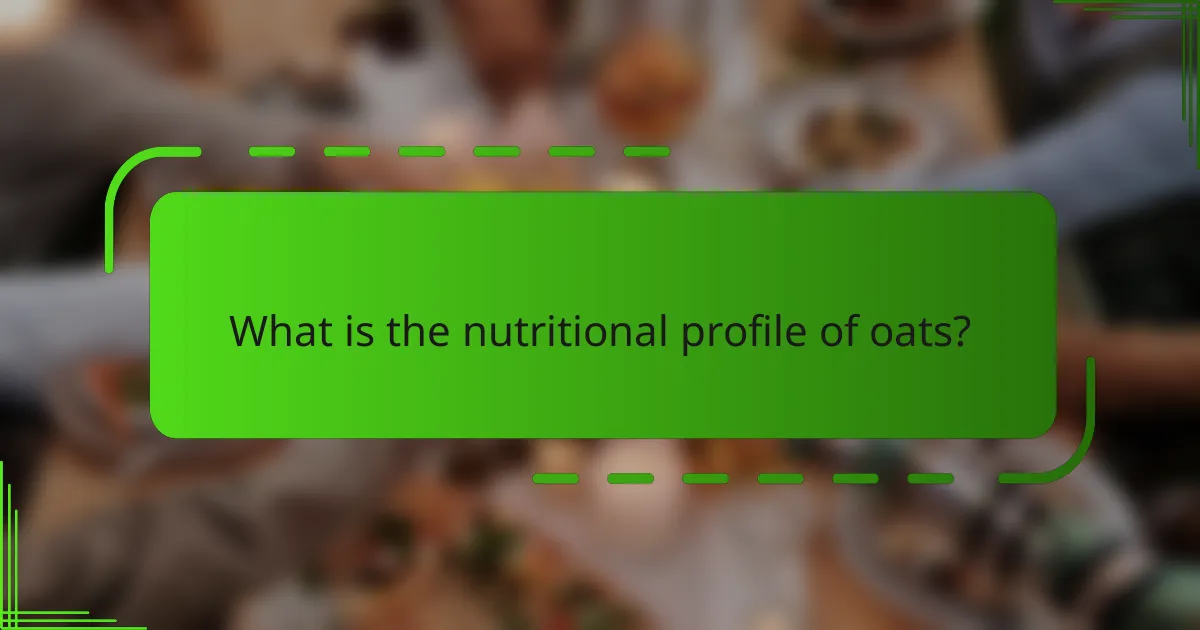Oats are a nutrient-dense whole grain known for their numerous health benefits, including lowering cholesterol levels and supporting heart health. Rich in soluble fiber, particularly beta-glucan, oats can help stabilize blood sugar levels and aid in weight management by promoting satiety. They provide essential vitamins and minerals, making them a valuable addition to a balanced diet. The article explores the nutritional profile of oats, effective cooking methods such as boiling, soaking, and baking, as well as serving ideas to incorporate oats into daily meals.

What are the health benefits of oats?
Oats provide numerous health benefits. They are rich in soluble fiber, particularly beta-glucan, which helps lower cholesterol levels. Studies show that consuming oats can reduce total cholesterol by 5-10%. Oats also support heart health by improving blood pressure and arterial function. They are a good source of antioxidants, including avenanthramides, which have anti-inflammatory properties. Oats can aid in weight management by promoting satiety, as they take longer to digest. Research indicates that oats can stabilize blood sugar levels, making them beneficial for people with diabetes. Additionally, oats support digestive health due to their high fiber content, which promotes regular bowel movements.
How do oats contribute to overall health?
Oats contribute to overall health by providing essential nutrients and promoting various health benefits. They are rich in dietary fiber, particularly beta-glucan, which helps lower cholesterol levels. Research shows that consuming oats can reduce the risk of heart disease. Oats also stabilize blood sugar levels, making them beneficial for diabetes management. Additionally, they provide a good source of protein, vitamins, and minerals. A study published in the Journal of Nutrition found that oats can enhance satiety and aid in weight management. Overall, oats are a nutritious food that supports heart health, blood sugar control, and weight management.
What specific nutrients in oats promote health benefits?
Oats contain specific nutrients that promote health benefits, including dietary fiber, protein, vitamins, and minerals. Dietary fiber, particularly beta-glucan, helps lower cholesterol levels and improve heart health. The protein in oats supports muscle growth and repair. Vitamins such as B vitamins contribute to energy metabolism. Essential minerals like magnesium and iron support various bodily functions, including oxygen transport and bone health. Research indicates that regular oat consumption can reduce the risk of cardiovascular disease and improve digestive health.
How do oats support heart health?
Oats support heart health primarily through their high soluble fiber content. This type of fiber helps lower cholesterol levels. Specifically, beta-glucan, a soluble fiber found in oats, reduces LDL cholesterol. Lowering LDL cholesterol decreases the risk of heart disease. Studies show that consuming oats can lower total cholesterol by 5 to 10 percent. Oats also contain antioxidants, which reduce inflammation and improve blood vessel function. Additionally, the potassium in oats helps regulate blood pressure. Regular oat consumption is associated with better heart health outcomes.
Why are oats considered a superfood?
Oats are considered a superfood due to their high nutritional value and health benefits. They are rich in dietary fiber, particularly beta-glucan, which helps lower cholesterol levels. Oats provide essential vitamins and minerals, including B vitamins, iron, and magnesium. The antioxidants in oats, such as avenanthramides, have anti-inflammatory properties. They promote heart health and improve digestion. Studies show that consuming oats can aid in weight management by increasing satiety. Their low glycemic index helps regulate blood sugar levels. Overall, oats are a nutrient-dense food that supports overall health.
What makes oats different from other grains?
Oats differ from other grains primarily due to their unique nutritional profile. They are rich in beta-glucans, a type of soluble fiber that helps lower cholesterol levels. Oats also provide a higher protein content compared to most grains. They contain essential vitamins and minerals, including magnesium, phosphorus, and iron. Oats are gluten-free, making them suitable for those with gluten sensitivity, provided they are processed in a gluten-free environment. Additionally, oats have a lower glycemic index, promoting better blood sugar control. These attributes contribute to oats being recognized for their health benefits, such as improved heart health and weight management.
How do oats assist in weight management?
Oats assist in weight management by promoting satiety and reducing overall calorie intake. They are high in soluble fiber, particularly beta-glucan. This fiber slows digestion and enhances feelings of fullness. Studies show that consuming oats can lead to lower hunger levels. For instance, a study published in the American Journal of Clinical Nutrition found that participants felt fuller after eating oatmeal compared to other breakfast options. Additionally, oats have a low glycemic index, which helps regulate blood sugar levels. Stable blood sugar contributes to reduced cravings and better appetite control. Overall, oats provide a nutritious and satisfying option for those looking to manage their weight effectively.

What is the nutritional profile of oats?
Oats are a nutrient-dense whole grain. They provide a rich source of carbohydrates, primarily in the form of dietary fiber. A typical serving of oats (about 100 grams) contains approximately 389 calories. They offer 66 grams of carbohydrates, of which 10 grams are dietary fiber. Oats also contain about 16.9 grams of protein per 100 grams.
In addition, oats are low in fat, with roughly 6.9 grams of total fat. They are a good source of essential vitamins and minerals. Oats provide significant amounts of manganese, phosphorus, magnesium, copper, iron, zinc, folate, and vitamin B1 (thiamine).
The soluble fiber in oats, particularly beta-glucan, is known to help lower cholesterol levels. Studies show that eating oats regularly can contribute to heart health. Overall, oats are a highly nutritious food option that supports various health benefits.
What are the macronutrient contents of oats?
Oats primarily contain carbohydrates, protein, and fat. In a typical 100-gram serving of raw oats, there are approximately 66 grams of carbohydrates. This includes around 10 grams of dietary fiber, which is beneficial for digestion. Oats also provide about 16.9 grams of protein, making them a good plant-based protein source. The fat content in oats is relatively low, at about 6.9 grams per 100 grams. This includes healthy unsaturated fats. Overall, oats are a nutritious food rich in macronutrients essential for a balanced diet.
How many calories are in a serving of oats?
A serving of oats typically contains about 150 calories. This value is based on a standard serving size of 1/2 cup of dry oats. The calorie content may vary slightly depending on the specific type of oats used. For instance, rolled oats and steel-cut oats have similar calorie counts. The nutritional profile of oats includes carbohydrates, fiber, and protein, which contribute to their overall caloric content.
What is the fiber content in oats and its benefits?
Oats contain approximately 10 grams of fiber per 100 grams. This high fiber content includes both soluble and insoluble fiber. Soluble fiber helps lower cholesterol levels and stabilizes blood sugar. It forms a gel-like substance in the gut, promoting satiety. Insoluble fiber aids in digestion and prevents constipation. Studies show that regular oat consumption can improve heart health and support weight management. The presence of beta-glucans, a type of soluble fiber in oats, is particularly beneficial for heart health.
What vitamins and minerals are found in oats?
Oats contain several essential vitamins and minerals. Key vitamins include B vitamins such as thiamin (B1), riboflavin (B2), niacin (B3), and folate (B9). Important minerals found in oats are manganese, phosphorus, magnesium, iron, and zinc.
Manganese is crucial for bone formation and metabolism. Phosphorus plays a role in energy production and bone health. Magnesium aids in muscle function and nerve transmission. Iron is essential for oxygen transport in the blood. Zinc supports immune function and wound healing.
The nutritional value of oats makes them a beneficial addition to a balanced diet.
Which vitamins are abundant in oats?
Oats are abundant in several vitamins, particularly vitamin B1 (thiamine) and vitamin B5 (pantothenic acid). These vitamins play essential roles in energy metabolism and the synthesis of hormones. Oats also contain smaller amounts of vitamin B2 (riboflavin) and vitamin E. The presence of these vitamins contributes to the overall nutritional value of oats. Studies indicate that oats provide a significant source of B vitamins, which support various bodily functions.
What minerals do oats provide and why are they important?
Oats provide several essential minerals, including manganese, phosphorus, magnesium, copper, iron, and zinc. Manganese is crucial for bone formation and metabolism. Phosphorus supports healthy bones and teeth. Magnesium plays a role in over 300 enzymatic reactions in the body and helps maintain normal muscle and nerve function. Copper aids in iron absorption and the formation of red blood cells. Iron is vital for transporting oxygen in the blood. Zinc supports immune function and wound healing. These minerals collectively contribute to overall health and well-being.

What are the best cooking methods for oats?
The best cooking methods for oats include boiling, soaking, and baking. Boiling oats involves cooking them in water or milk on the stovetop until they reach the desired consistency. This method typically takes about 5 to 10 minutes for rolled oats and longer for steel-cut oats. Soaking oats overnight in liquid allows for easier digestion and quicker cooking. This method is often used for overnight oats, which can be eaten cold. Baking oats is another popular method, often used in recipes for oatmeal cookies or baked oatmeal dishes, providing a different texture and flavor. Each of these methods retains the nutritional benefits of oats, including their high fiber content and essential nutrients.
How can oats be prepared for maximum health benefits?
Oats can be prepared for maximum health benefits by soaking, cooking, or adding nutritious toppings. Soaking oats overnight increases their digestibility and nutrient absorption. Cooking oats, such as in oatmeal, enhances their flavor and texture. Using water or milk for cooking adds hydration and nutrients. Adding fruits, nuts, or seeds boosts fiber, vitamins, and healthy fats. Incorporating spices like cinnamon can enhance antioxidant properties. A study published in the Journal of Nutrition found that whole oats can lower cholesterol levels and improve heart health.
What are the differences between cooking methods (boiling, baking, etc.)?
Cooking methods differ primarily in heat application and moisture levels. Boiling involves submerging food in water or broth at high temperatures. This method cooks food quickly and retains moisture but can lead to nutrient loss. Baking uses dry heat in an oven, allowing for browning and flavor development. It typically requires longer cooking times and can create a crispy texture. Steaming cooks food using steam from boiling water, preserving nutrients and moisture. Each method affects the food’s texture, flavor, and nutritional value differently. For example, boiling oats may result in a softer texture, while baking can create a chewy consistency.
How does soaking oats affect their nutritional value?
Soaking oats enhances their nutritional value by increasing nutrient availability and digestibility. This process activates enzymes that break down phytic acid, which can inhibit mineral absorption. As a result, minerals like iron, calcium, and zinc become more bioavailable. Soaking also softens the oats, making them easier to digest. Studies indicate that soaked oats can lead to better nutrient absorption compared to unsoaked oats. Additionally, soaking can reduce cooking time, preserving more nutrients during preparation. Overall, soaking oats optimizes their health benefits and nutrient profile.
What are popular recipes that include oats?
Popular recipes that include oats are oatmeal, overnight oats, and oat pancakes. Oatmeal is a classic breakfast dish made by cooking oats in water or milk. Overnight oats are prepared by soaking oats in milk or yogurt overnight, allowing for easy meal prep. Oat pancakes combine oats with eggs and milk for a nutritious twist on traditional pancakes. Other popular recipes include oat granola bars and oatmeal cookies. These recipes highlight the versatility of oats in various meals. Oats are rich in fiber and provide numerous health benefits.
How can oats be used in breakfast dishes?
Oats can be used in various breakfast dishes. They can be cooked as oatmeal, providing a warm, hearty meal. Oats can also be blended into smoothies for added nutrition. Overnight oats are a popular option, soaked in milk or yogurt for convenience. Baked oat dishes, like oat muffins or bars, offer a portable breakfast choice. Oats can be added to pancakes or waffles for extra fiber. Granola, made from baked oats, serves as a crunchy topping for yogurt or fruit. These methods showcase oats’ versatility and nutritional benefits.
What are some creative ways to incorporate oats into snacks?
Oats can be creatively incorporated into snacks in various ways. One method is to make oat-based energy balls. These typically combine oats with nut butter, honey, and add-ins like chocolate chips or dried fruit. Another idea is to use oats in homemade granola bars. Combining oats with nuts, seeds, and a binding agent creates a nutritious snack. Oats can also be added to smoothies for extra fiber and texture. Blending oats with fruits and yogurt enhances the nutritional profile. Baking oatmeal cookies is another option, where oats provide a chewy texture. Finally, savory oat crackers can be made by mixing oats with herbs and cheese, then baking until crisp. Each of these methods showcases oats’ versatility and health benefits.
What are some tips for serving oats effectively?
Serve oats with a variety of toppings to enhance flavor and nutrition. Popular toppings include fruits, nuts, seeds, and honey. Mixing in yogurt can add creaminess and probiotics. Cooking oats with milk instead of water increases protein content. Serve oats warm for a comforting meal or cold for a refreshing option. Consider portion sizes; a standard serving is about 1/2 cup of dry oats. Use spices like cinnamon or vanilla for added taste without extra calories. Preparing overnight oats allows for quick, nutritious breakfasts.
How can oats be paired with other ingredients for better taste?
Oats can be paired with various ingredients to enhance their taste. Common combinations include fruits like bananas, berries, and apples, which add natural sweetness. Nuts and seeds, such as almonds and chia seeds, provide crunch and healthy fats. Spices like cinnamon and nutmeg can elevate flavor profiles significantly. Yogurt or milk can create a creamy texture, enriching the overall dish. Sweeteners like honey or maple syrup can also be added for extra sweetness. These pairings not only improve taste but also increase the nutritional value of oats. For instance, adding berries boosts antioxidant content, while nuts enhance protein levels.
What are common toppings for oatmeal that enhance flavor and nutrition?
Common toppings for oatmeal that enhance flavor and nutrition include fruits, nuts, seeds, and sweeteners. Fruits like bananas, berries, and apples add natural sweetness and vitamins. Nuts such as almonds and walnuts provide healthy fats and protein. Seeds like chia and flaxseeds boost fiber and omega-3 content. Sweeteners, including honey and maple syrup, can enhance taste while offering antioxidants. These toppings not only improve the flavor but also increase the overall nutritional value of oatmeal.
Oats are a nutrient-dense whole grain known for their numerous health benefits, including cholesterol reduction, heart health support, and blood sugar stabilization. This article explores the nutritional profile of oats, highlighting key components such as dietary fiber, protein, vitamins, and minerals. It also discusses various cooking methods and serving ideas that maximize the health benefits of oats, including popular recipes and creative snack options. Additionally, the article emphasizes the unique attributes of oats that differentiate them from other grains, reinforcing their status as a superfood.